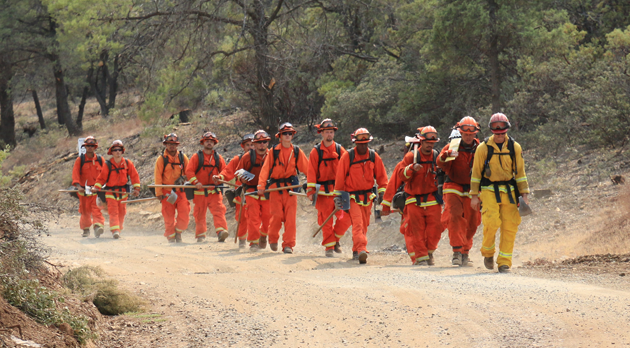In California, the use of inmate firefighters has long been a contentious issue. With wildfires raging across the state each year, the debate surrounding the ethics and fairness of employing incarcerated individuals to fight these blazes has intensified. Recently, amendments to Section 3041.2 of the California Code of Regulations have sparked fresh discussions, particularly regarding inmate pay rates for firefighting duties.
Understanding the Amendments
The recent amendments, notably in subsection 3041.2(a)(2), have outlined a revised pay schedule for inmate firefighters based on their grade. The grades range from Grade 1 to Grade 4, with corresponding maximum daily rates ranging from $10.24 to $5.80. This schedule reflects the compensation structure for inmates engaged in firefighting activities within the conservation camps.
Additionally, subsection 3041.2(b) introduces exceptions to the standard pay schedules, allowing for adjustments in cases of extraordinary circumstances. This includes the possibility of paying wages comparable to those in the Prison Industry Authority inmate pay program for specialized projects or assignments requiring high skill levels.
Furthermore, subsection 3041.2(c) emphasizes that pay increases for inmate firefighters will not be automatic and will instead be based on factors such as available funding, performance evaluations, and supervisor recommendations.
Conservation Camp Pay Schedule:
- Grade 1: $10.24 (Max Daily Rate)
- Grade 2: $7.80 (Max Daily Rate)
- Grade 3: $6.68 (Max Daily Rate)
- Grade 4: $5.80 (Max Daily Rate)
General Pay Schedule:
- Lead Person (Level 1 DOT Skill Level 9): $0.32-$0.37 per hour; $48-$56 per month
- Special Skill (Level 2 DOT Skill Levels 7-8): $0.19-$0.32 per hour; $29-$48 per month
- Technician (Level 3 DOT Skill Levels 5-6): $0.15-$0.24 per hour; $23-$36 per month
- Semi-Skilled (Level 4 DOT Skill Levels 3-4): $0.11-$0.18 per hour; $17-$27 per month
- Laborer (Level 5 DOT Skill Levels 1-2): $0.08-$0.13 per hour; $12-$20 per month
Pay Scale Levels for Hours Worked:
- Lead Person (Level 1 DOT 9): $0.64-$0.74 per hour
- Special Skill (Level 2 DOT 7-8): $0.38-$0.64 per hour
- Technician (Level 3 DOT 5-6): $0.30-$0.48 per hour
- Semi-Skilled (Level 4 DOT 3-4): $0.22-$0.36 per hour
- Laborer (Level 5 DOT 1-2): $0.16-$0.26 per hour
These rates provide a framework for the compensation of inmate firefighters based on their grade and skill level. It’s important to note that these rates are subject to change based on available funding, performance evaluations, and other factors outlined in the regulations.
Implications and Controversies
While these amendments aim to streamline the pay structure and provide clarity on exceptional cases, they have not been without controversy.
- Ethical Concerns: Critics argue that paying incarcerated individuals significantly lower wages for hazardous work, such as firefighting, raises ethical questions about fair compensation and exploitation. The disparity between inmate wages and those of non-incarcerated firefighters performing similar duties has been a focal point of criticism.
- Recruitment and Retention: By allowing exceptions for higher pay rates in certain circumstances, the amendments acknowledge the challenges of recruiting and retaining inmate firefighters. However, concerns persist regarding the criteria for determining these exceptions and the potential for abuse or favoritism.
- Long-Term Impact: The decision to base pay increases on performance evaluations rather than longevity in the assignment has raised concerns about the potential for arbitrary decision-making and disparities in treatment among inmate firefighters.
The amendments to Section 3041.2 of the California Code of Regulations represent an attempt to address some of the longstanding issues surrounding inmate pay for firefighting duties. While they provide a more structured framework for compensation and acknowledge the need for flexibility in exceptional cases, they have not fully assuaged concerns regarding fairness, ethics, and the treatment of incarcerated individuals.
The debate surrounding inmate firefighter pay is multifaceted, touching on broader issues of prison labor, rehabilitation, and social justice. As California continues to grapple with the complexities of wildfire management and the role of inmate firefighters within it, the conversation around their pay and treatment remains ever-relevant.





